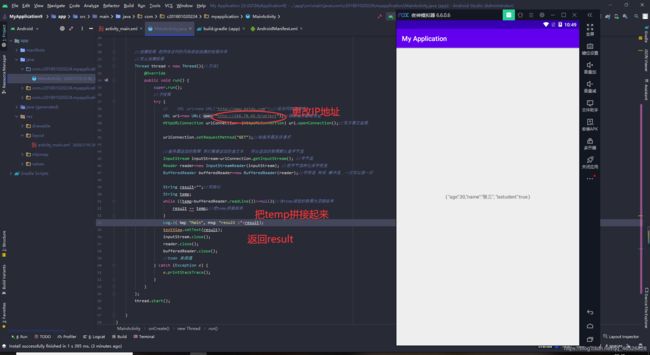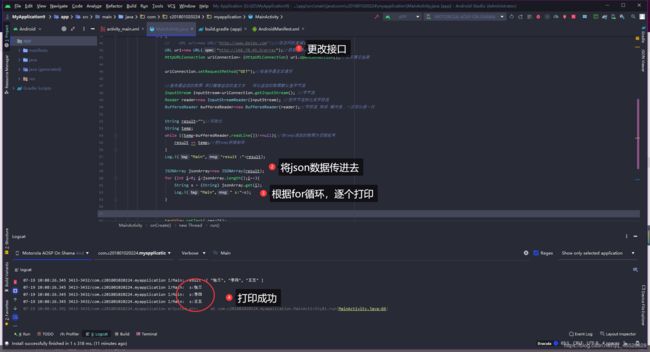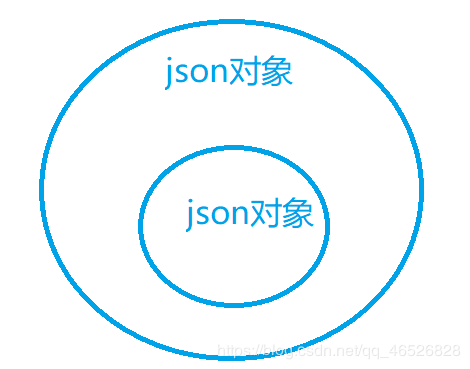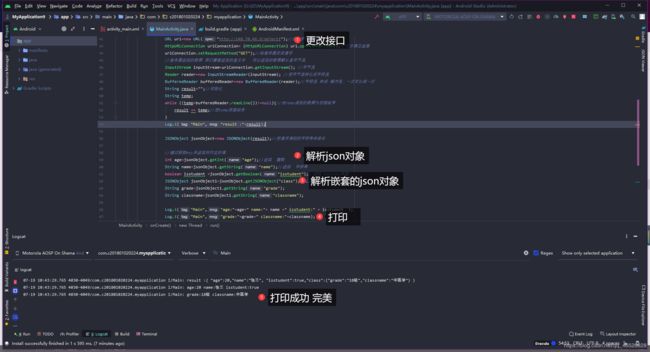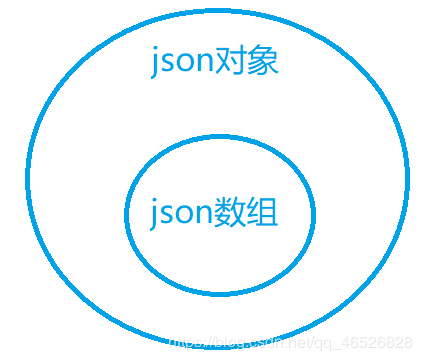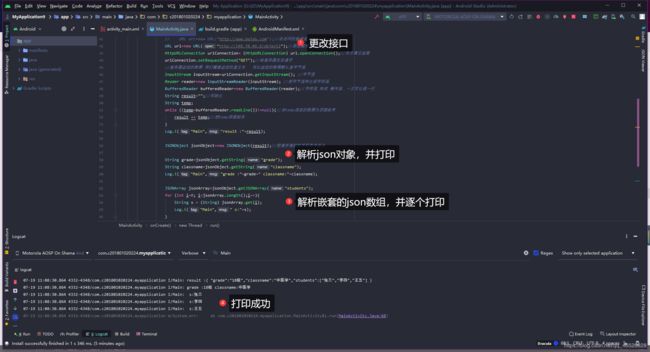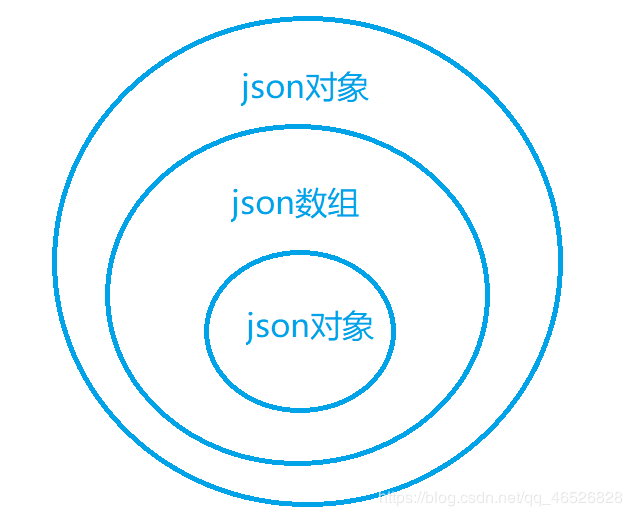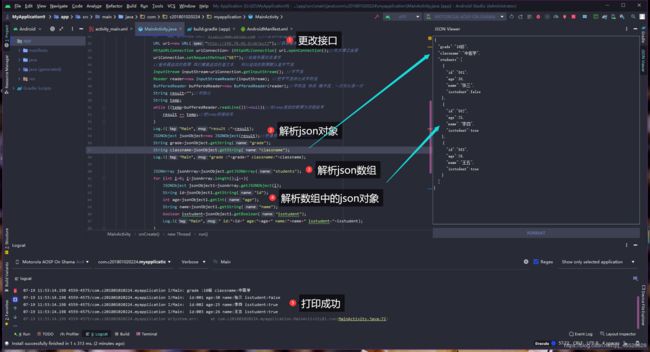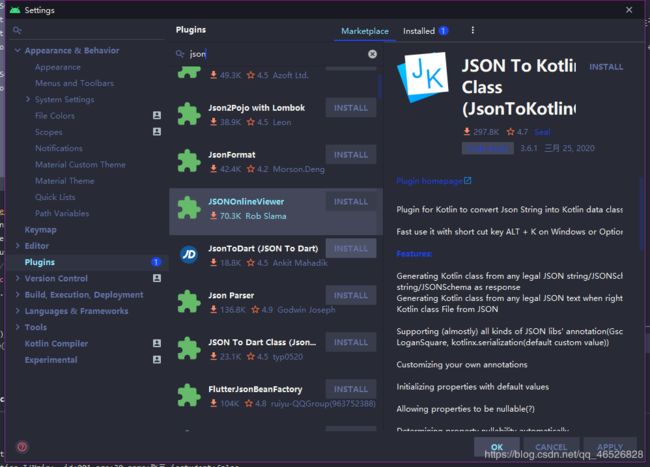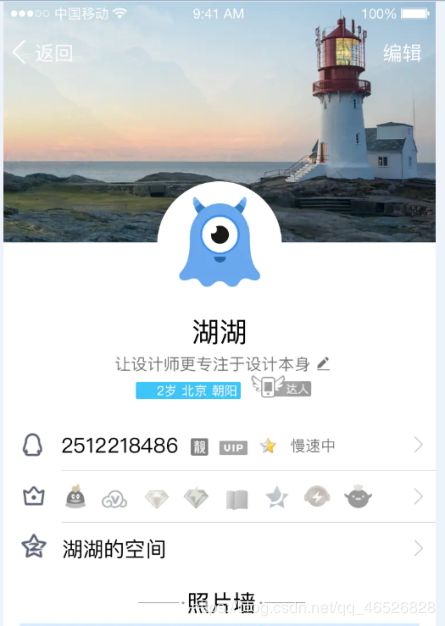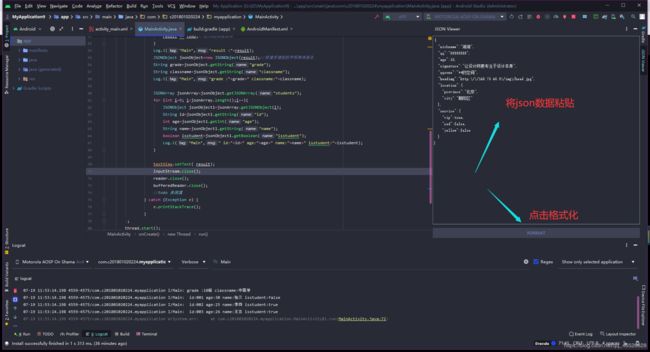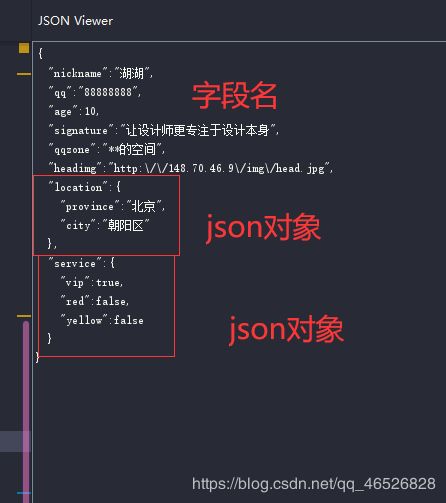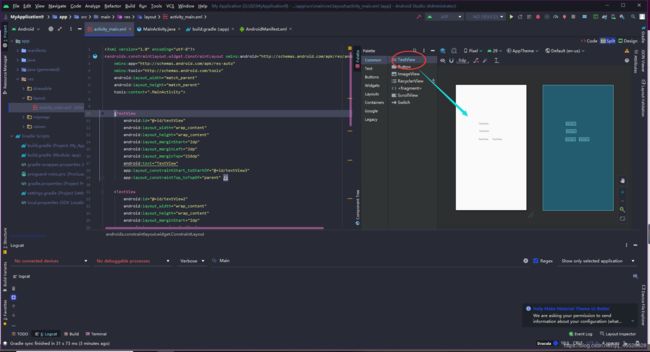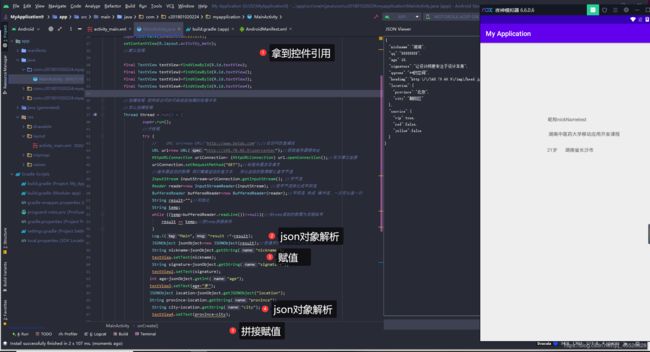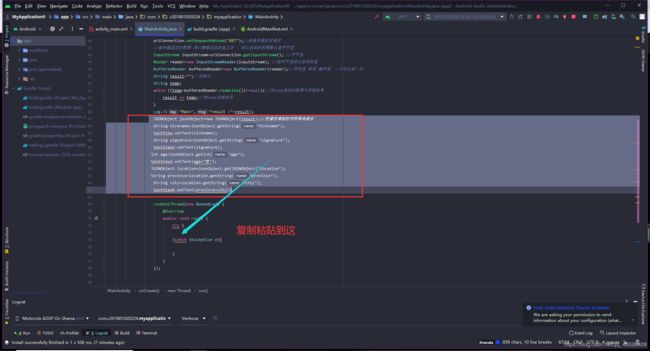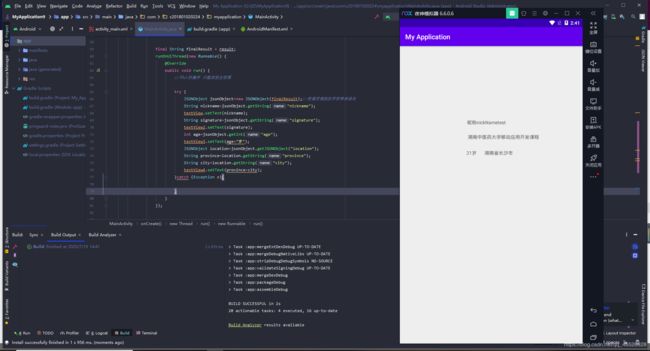Android 入门第六讲02-JSON(JSON数据结构简介,JSON 表示一个对象,JSON 格式表示数组,JSON嵌套,JSON 解析实战项目(源码免费))
Android 入门第六讲02-JSON(JSON数据结构简介,JSON 表示一个对象,JSON 格式表示数组,JSON嵌套,JSON 解析实战项目(源码免费))
- 1.JSON数据结构简介
- 2.JSON 表示一个对象
- 1.JSON格式特点1
- 2.java解析方法
- 3.JSON 格式表示数组
- 1.JSON格式特点2
- 2.Java解析方法
- 4.JSON嵌套
- 1.JSON数据嵌套1-json对象+json对象
- 2.JSON数据嵌套2-json对象+json数组
- 3.JSON数据嵌套3-json对象+json数组+json对象
- 5.JSON 解析实战
- 1.关于线程问题
- 2.免费源码
Android 入门第六讲01-网络编程(网络访问概述,通过HTTP访问网络(创建线程的两种方法),网络获取多个值的方法)
1.JSON数据结构简介
json数据结构一种与开发语言无关的、轻量级的数据存储格式,全称JavaScript Object Notation,一种数据格式的标准规范,起初来源于JavaScript这门语言,后来随着使用的广泛,几乎每门开发语言都有处理JSON的API。
(php python JavaScript都对json数据结构进行解析)
优点:易于人的阅读和编写,易于程序解析与生产
2.JSON 表示一个对象
1.JSON格式特点1
- 一般首先一个大括号{},同时里面是一种Key-Value的存储形式
- key 一般是一个字符串
- value 可以是字符串,数字,boolean
案例1:
IP地址:http://148.70.46.9/object
json数据 :{ “age”:30,“name”:“张三”, “isstudent”:true }
2.java解析方法
第一步,先将json数据结构拼接起来
这里我们没有用temp了,因为temp一次只读一行,后面我们json比较长的时候会有多行,所以多行的话,我们先把所有的json结构拼接起来,拼到一个字符串里面。
public class MainActivity extends AppCompatActivity {
@Override
protected void onCreate(Bundle savedInstanceState) {
super.onCreate(savedInstanceState);
setContentView(R.layout.activity_main);
//默认线程
final TextView textView=findViewById(R.id.text);
//创建线程 把网络访问的代码放到创建的线程中来
//怎么创建线程
Thread thread = new Thread(){//方法1
@Override
public void run() {
super.run();
//子线程
try {
// URL url=new URL("http://www.baidu.com");//这访问的是域名
URL url=new URL("http://148.70.46.9/object");//获取服务器哦地址
HttpURLConnection urlConnection= (HttpURLConnection) url.openConnection();//双方建立连接
urlConnection.setRequestMethod("GET");//给服务器发送请求
//服务器返回的数据 我们需要返回的是文本 所以返回的数据默认是字节流
InputStream inputStream=urlConnection.getInputStream(); //字节流
Reader reader=new InputStreamReader(inputStream); //把字节流转化成字符流
BufferedReader bufferedReader=new BufferedReader(reader);//字符流 转成 缓冲流,一次可以读一行
String result="";//初始化
String temp;
while ((temp=bufferedReader.readLine())!=null){//当temp读到的数据为空就结束
result += temp;//把temp拼接起来
}
Log.i("Main","result :"+result);
textView.setText(result);
inputStream.close();
reader.close();
bufferedReader.close();
//todo 关闭流
} catch (Exception e) {
e.printStackTrace();
}
}
};
thread.start();
}
}
xml代码(其实就只有一个文本,强迫症的我还是贴一下)
<?xml version="1.0" encoding="utf-8"?>
<androidx.constraintlayout.widget.ConstraintLayout xmlns:android="http://schemas.android.com/apk/res/android"
xmlns:app="http://schemas.android.com/apk/res-auto"
xmlns:tools="http://schemas.android.com/tools"
android:layout_width="match_parent"
android:layout_height="match_parent"
tools:context=".MainActivity">
<TextView
android:id="@+id/text"
android:layout_width="wrap_content"
android:layout_height="wrap_content"
android:text="Hello World!"
app:layout_constraintBottom_toBottomOf="parent"
app:layout_constraintLeft_toLeftOf="parent"
app:layout_constraintRight_toRightOf="parent"
app:layout_constraintTop_toTopOf="parent" />
</androidx.constraintlayout.widget.ConstraintLayout>
第二步,我们来分析一下,这个json的数据结构
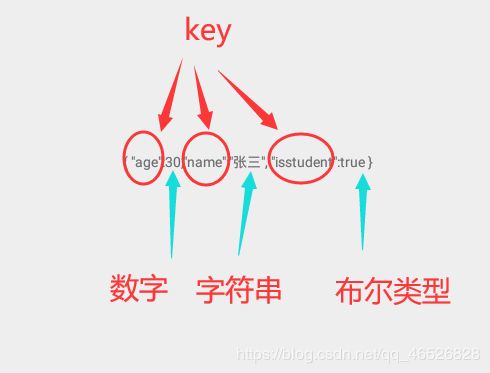
然后通过获取key来返回所对应的值
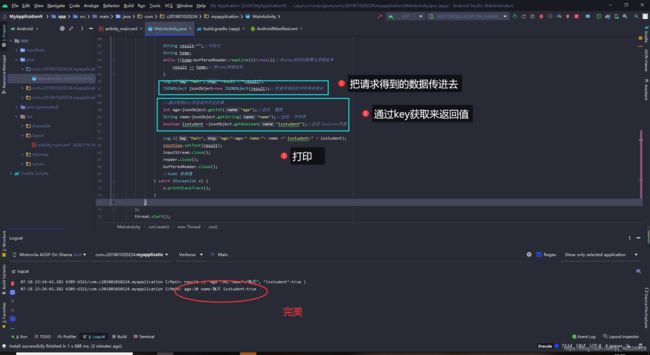
核心代码
JSONObject jsonObject=new JSONObject(result);//把请求得到的字符串传进去
//通过获取key来返回所对应的值
int age=jsonObject.getInt("age");//返回 整数
String name=jsonObject.getString("name");//返回 字符串
boolean isstudent =jsonObject.getBoolean("isstudent");//返回 boolean类型
Log.i("Main","age:"+age+" name:"+ name +" isstudent:" + isstudent);
textView.setText( "age:"+age);//把age返回的值填充到文本控件
3.JSON 格式表示数组
1.JSON格式特点2
- 如果是一个中括号[],里面全部是value,value之间用逗号给开
- [value,value,…]
- value 可以是字符串,数字,boolean(必须是同一种类型)
案例2:
IP地址:http://148.70.46.9/array
json数据: [ “张三”, “李四”, “王五” ]
2.Java解析方法
先将json数据传进JSONArray,然后再用for循环,根据字符串在数组中的位置逐个打印
核心代码
JSONArray jsonArray=new JSONArray(result);
for (int i=0; i<jsonArray.length();i++){
String s = (String) jsonArray.get(i);
Log.i("Main"," s:"+s);
}
4.JSON嵌套
1.JSON数据嵌套1-json对象+json对象
JSON格式特点1
- value也可以是一个json对象
案例3:
IP地址:http://148.70.46.9/object1
json数据:{ “age”:20,“name”:“张三”, “isstudent”:true,“class”:{“grade”:“18级”,“classname”:“中医学”} }
java解析方法
这里讲一下如何简单判断用哪种方法解析 :最外层是大括号{}的就用JSONObject,最外层是中括号【】的就用JSONArray ,我们这组数据最外层是大括号,所以我们用JSONObject,然后解析出的数据里,再解析的嵌套的json对象
JSONObject jsonObject=new JSONObject(result);//把请求得到的字符串传进去
//通过获取key来返回所对应的值
int age=jsonObject.getInt("age");//返回 整数
String name=jsonObject.getString("name");//返回 字符串
boolean isstudent =jsonObject.getBoolean("isstudent");//返回 boolean类型
JSONObject jsonObject1=jsonObject.getJSONObject("class");//返回JSON对象
String grade=jsonObject1.getString("grade");
String classname=jsonObject1.getString("classname");
Log.i("Main","age:"+age+" name:"+ name +" isstudent:" + isstudent );
Log.i("Main","grade:"+grade+" classname:"+classname);
2.JSON数据嵌套2-json对象+json数组
JSON格式特点2
- value也可以是一个json数组
案例4:
IP地址:http://148.70.46.9/object2
json数据:{ “grade”:“18级”,“classname”:“中医学”,“students”:[“张三”,“李四”,“王五”] }
java解析方法
先解析json对象,再解析json数组
核心代码
JSONObject jsonObject=new JSONObject(result);//把请求得到的字符串传进去
String grade=jsonObject.getString("grade");
String classname=jsonObject.getString("classname");
Log.i("Main","grade :"+grade+" classname:"+classname);
JSONArray jsonArray=jsonObject.getJSONArray("students");
for (int i=0; i<jsonArray.length();i++){
String s = (String) jsonArray.get(i);
Log.i("Main"," s:"+s);
}
3.JSON数据嵌套3-json对象+json数组+json对象
JSON格式总结:json的key对应的value 可以是整型、字符型、布尔型、Json数组、Json对象
案例5:
IP地址:http://148.70.46.9/object3
json数据: {“grade”:“18级”,“classname”:“中医学”,“students”:[ {“id”:“001”,“age”:30,“name”:“张三”, “isstudent”:false }, { “id”:“002”,“age”:25,“name”:“李四”, “isstudent”:true }, {“id”:“003”,“age”:26,“name”:“王五”, “isstudent”:true } ]}
我们先对这json数据进行分析(可以用as自带插件,网上也有很多在线解析工具,例如我推荐的下面这个)
JSON在线解析及格式化验证
第一步,打开工具
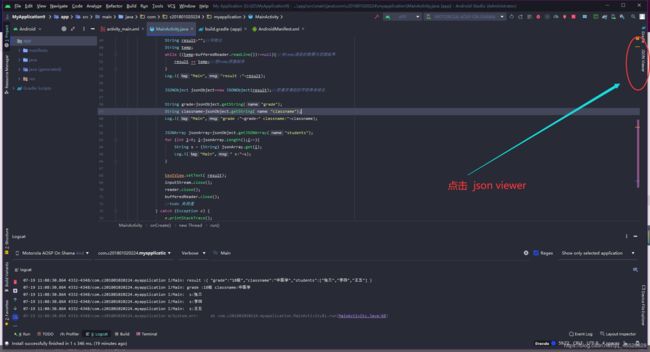
第二步,粘贴数据并格式化
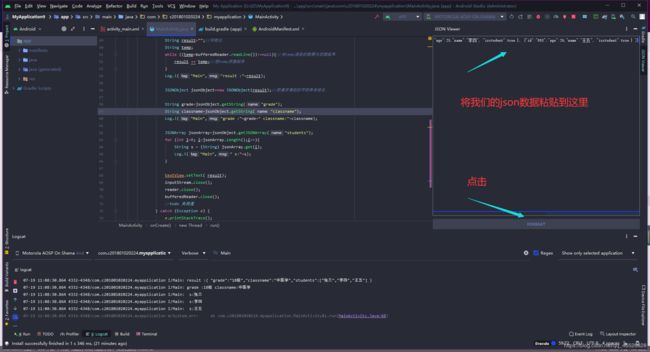
第三步,分析json数据结构
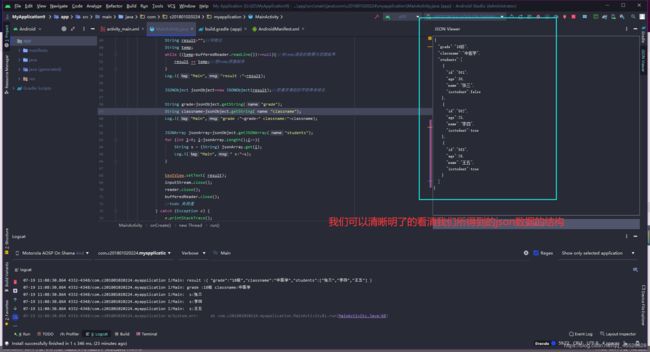 java解析方法
java解析方法
最外层是一个json对象,里面包含两个字段并且嵌套了一个数组,数组是由三个json对象组成的
JSONObject jsonObject=new JSONObject(result);//把请求得到的字符串传进去
String grade=jsonObject.getString("grade");
String classname=jsonObject.getString("classname");
Log.i("Main","grade :"+grade+" classname:"+classname);
JSONArray jsonArray=jsonObject.getJSONArray("students");
for (int i=0; i<jsonArray.length();i++){
JSONObject jsonObject1=jsonArray.getJSONObject(i);
String id=jsonObject1.getString("id");
int age=jsonObject1.getInt("age");
String name=jsonObject1.getString("name");
boolean isstudent=jsonObject1.getBoolean("isstudent");
Log.i("Main"," id:"+id+" age:"+age+" name:"+name+" isstudent:"+isstudent);
}
5.JSON 解析实战
根据以下的json数据接口完成下图UI(我这里粗略的写一下,其他的都方法上述都已讲到)
实战:
IP地址:http://148.70.46.9/usercenter
json数据:{ “nickname”:“湖湖”,“qq”:“88888888”, “age”:10,“signature”:“让设计师更专注于设计本身”,“qqzone”:"**的空间",“headimg”:“http://148.70.46.9/img/head.jpg”,“location”:{“province”:“北京”,“city”:“朝阳区”},“service”:{“vip”:true,“red”:false,“yellow”:false} }
那个heading的地址我这里格式化有点小问题,但是不影响我们分析结构
<?xml version="1.0" encoding="utf-8"?>
<androidx.constraintlayout.widget.ConstraintLayout xmlns:android="http://schemas.android.com/apk/res/android"
xmlns:app="http://schemas.android.com/apk/res-auto"
xmlns:tools="http://schemas.android.com/tools"
android:layout_width="match_parent"
android:layout_height="match_parent"
tools:context=".MainActivity">
<TextView
android:id="@+id/textView"
android:layout_width="wrap_content"
android:layout_height="wrap_content"
android:layout_marginStart="2dp"
android:layout_marginLeft="2dp"
android:layout_marginTop="216dp"
android:text="TextView"
app:layout_constraintStart_toStartOf="@+id/textView3"
app:layout_constraintTop_toTopOf="parent" />
<TextView
android:id="@+id/textView2"
android:layout_width="wrap_content"
android:layout_height="wrap_content"
android:layout_marginStart="2dp"
android:layout_marginLeft="2dp"
android:layout_marginTop="24dp"
android:text="TextView"
app:layout_constraintStart_toStartOf="@+id/textView"
app:layout_constraintTop_toBottomOf="@+id/textView" />
<TextView
android:id="@+id/textView3"
android:layout_width="wrap_content"
android:layout_height="wrap_content"
android:layout_marginEnd="23dp"
android:layout_marginRight="23dp"
android:text="TextView"
app:layout_constraintBaseline_toBaselineOf="@+id/textView4"
app:layout_constraintEnd_toStartOf="@+id/textView4"
app:layout_constraintHorizontal_chainStyle="packed"
app:layout_constraintStart_toStartOf="parent" />
<TextView
android:id="@+id/textView4"
android:layout_width="wrap_content"
android:layout_height="wrap_content"
android:layout_marginTop="28dp"
android:layout_marginEnd="10dp"
android:layout_marginRight="10dp"
android:text="TextView"
app:layout_constraintEnd_toEndOf="parent"
app:layout_constraintStart_toEndOf="@+id/textView3"
app:layout_constraintTop_toBottomOf="@+id/textView2" />
</androidx.constraintlayout.widget.ConstraintLayout>
1.关于线程问题
解决方法,创建一个主线程
`
runOnUiThread(new Runnable() {
@Override
public void run() {
//对ui的操作 只能放到主线程
try {
}catch (Exception e){
}
}
});`
出现这个问题的原因是,我们本来操作是在一个子线程里执行的,但是子线程是不能修改ui的,我们要把修改ui的操作放到主线程里面
运行结果
代码
public class MainActivity extends AppCompatActivity {
@Override
protected void onCreate(Bundle savedInstanceState) {
super.onCreate(savedInstanceState);
setContentView(R.layout.activity_main);
//默认线程
final TextView textView=findViewById(R.id.textView);
final TextView textView2=findViewById(R.id.textView2);
final TextView textView3=findViewById(R.id.textView3);
final TextView textView4=findViewById(R.id.textView4);
//创建线程 把网络访问的代码放到创建的线程中来
//怎么创建线程
Thread thread = new Thread(){//方法1
@Override
public void run() {
super.run();
//子线程
try {
// URL url=new URL("http://www.baidu.com");//这访问的是域名
URL url=new URL("http://148.70.46.9/usercenter");//获取服务器哦地址
HttpURLConnection urlConnection= (HttpURLConnection) url.openConnection();//双方建立连接
urlConnection.setRequestMethod("GET");//给服务器发送请求
//服务器返回的数据 我们需要返回的是文本 所以返回的数据默认是字节流
InputStream inputStream=urlConnection.getInputStream(); //字节流
Reader reader=new InputStreamReader(inputStream); //把字节流转化成字符流
BufferedReader bufferedReader=new BufferedReader(reader);//字符流 转成 缓冲流,一次可以读一行
String result="";//初始化
String temp;
while ((temp=bufferedReader.readLine())!=null){//当temp读到的数据为空就结束
result += temp;//把temp拼接起来
}
Log.i("Main","result :"+result);
final String finalResult = result;
runOnUiThread(new Runnable() {
@Override
public void run() {
//对ui的操作 只能放到主线程
try {
JSONObject jsonObject=new JSONObject(finalResult);//把请求得到的字符串传进去
String nickname=jsonObject.getString("nickname");
textView.setText(nickname);
String signature=jsonObject.getString("signature");
textView2.setText(signature);
int age=jsonObject.getInt("age");
textView3.setText(age+"岁");
JSONObject location=jsonObject.getJSONObject("location");
String province=location.getString("province");
String city=location.getString("city");
textView4.setText(province+city);
}catch (Exception e){
}
}
});
inputStream.close();
reader.close();
bufferedReader.close();
//todo 关闭流
} catch (Exception e) {
e.printStackTrace();
}
}
};
thread.start();
}
}
2.免费源码
https://download.csdn.net/download/qq_46526828/12638845
运行结果
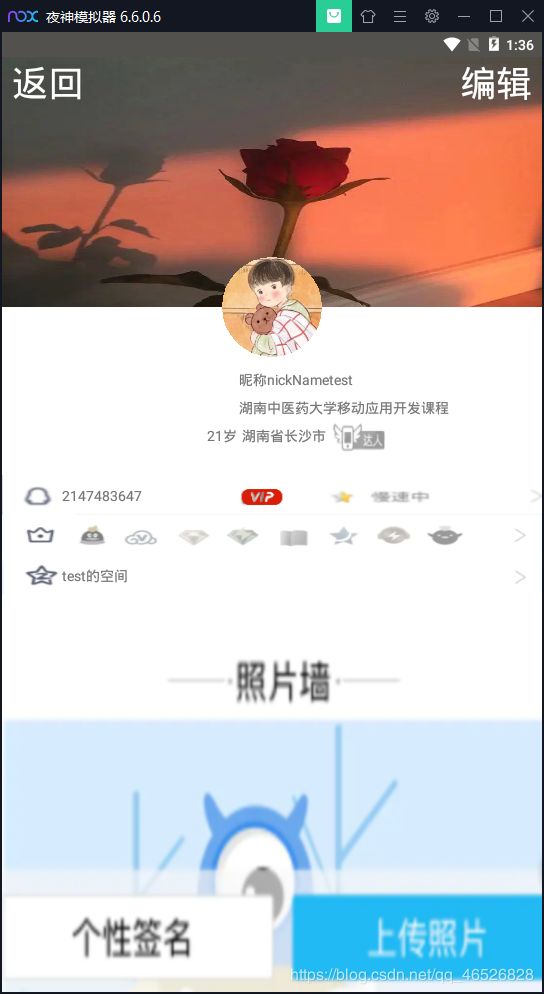
关于json的内容就讲到这里啦,欢迎各路小伙伴指点和阅读,我们一起进步,奥利给,谢谢您的阅读,我们下一讲继续奋斗!!!
Android 入门第六讲03-Handler(学会Debug模式断点调试,Handler机制(线程问题分析,Handler的使用方法),Handler的原理(超详细))
